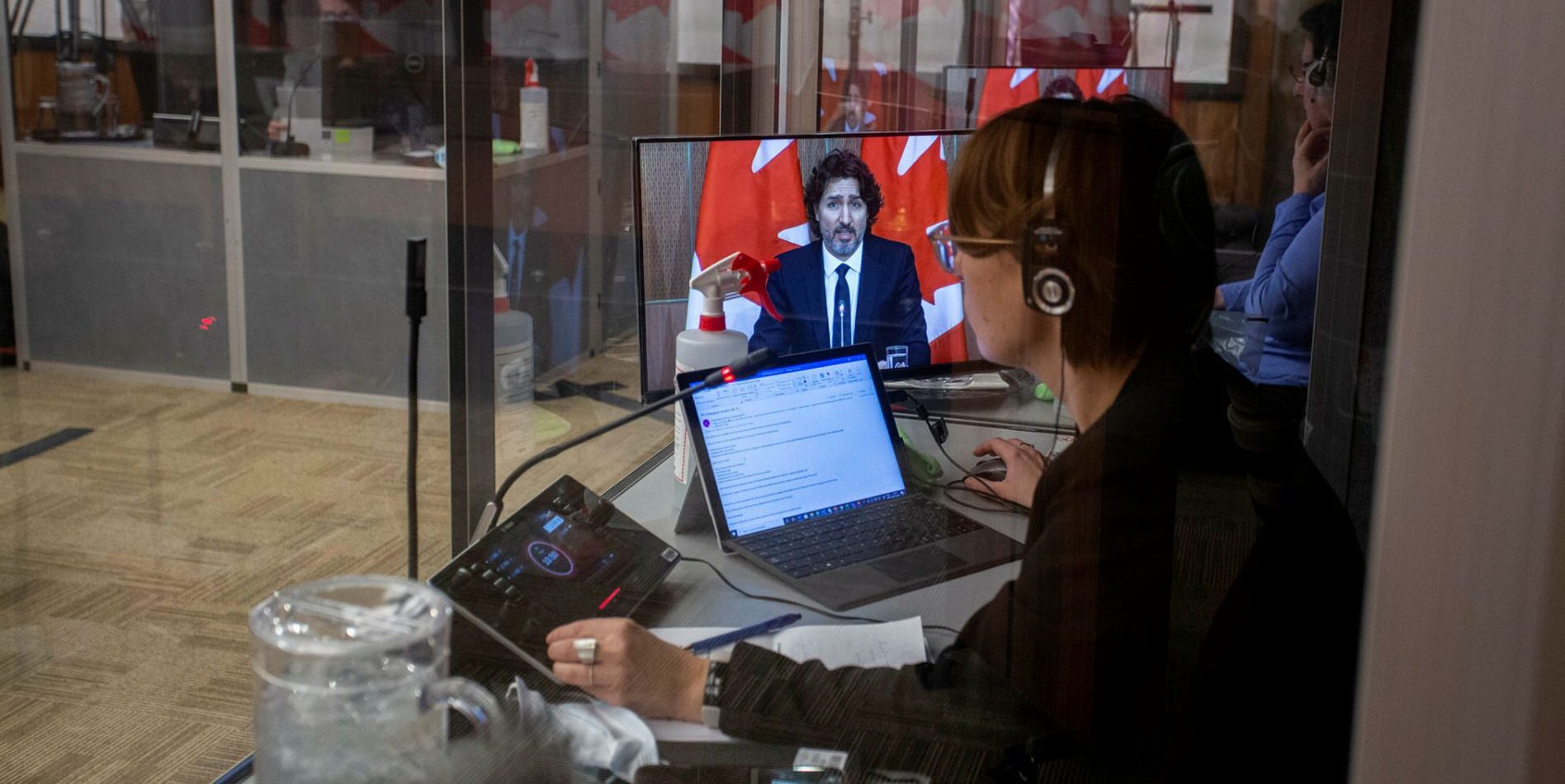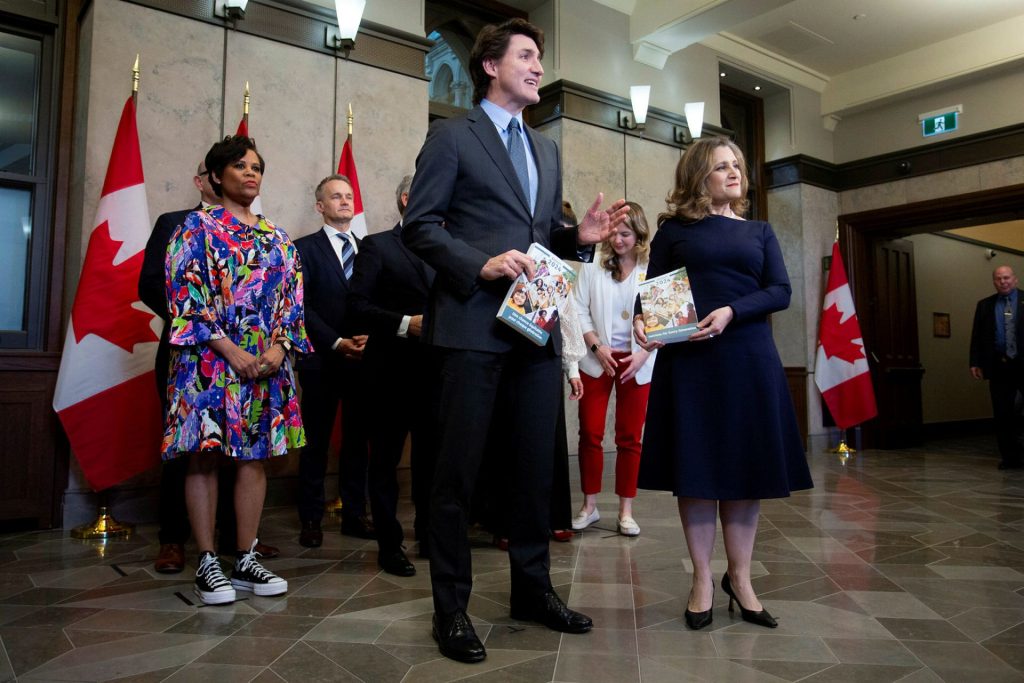New graduate programs to boost pool of potential federal government interpreters amid ongoing shortage, but hurdles remain

Two new graduate programs in conference interpreting announced since the fall will boost the potential crop of fresh talent with an anticipated 35 new admission slots per year, but how many will ultimately graduate, seek jobs at Parliament, and subsequently pass the federal Translation Bureau’s accreditation exam remains to be seen.
Interpreters must be accredited by the bureau in order to be hired as staff or freelancers and cover parliamentary proceedings. In the most recent exam held by the bureau this past October, none of the 21 candidates who sat the test successfully passed.
The Translation Bureau—and Parliament generally—have been grappling with a shortage of qualified interpreters amid efforts to boost interpretation capacity and support the rising number of meeting hours being logged by parliamentarians in recent years.
The shortage, which took root prior to COVID, was exacerbated by the pandemic as a result of the increased rates of injury and strain experienced by interpreters while covering remote participants. At the time, less stringent guidelines than have since been introduced were in place regarding the microphone equipment and internet connections used during virtual proceedings. Other efforts have also since been made to improve the quality of sound fed to interpreters covering remote participants, and to protect interpreters from dangerous sound spikes that can be caused by in-person participants, which have helped reduce risks to interpreters and lower injury report rates.
Still, natural attrition of the workforce remains a challenge, and the bureau has noted difficulties in attracting interpreters to live and work in the National Capital Region, leading to the piloting and subsequent adoption of remote simultaneous interpretation in 2023, which enables interpreters to work remotely. The International Association of Conference Interpreters (AIIC) Canada, an association that counts federal freelance interpreters among its members, has warned of a “looming crisis” with regard to staffing levels, with a 2022 survey conducted by the association having found that 49 per cent of the 92 accredited freelance interpreters who responded planned to retire in the next five years.
The 2024 federal budget allocated $31.9-million over five years and $3-million per year going forward to the Translation Bureau under Public Services and Procurement Canada (PSPC) in order “to expand translation and interpretation capacity in Parliament.” The budget also set out $1.1-million over five years and $200,000 going forward to establish a scholarship program, with that funding coming from within PSPC’s “existing resources.”

Since then, PSPC has announced partnerships with two universities to offer new graduate programs in conference interpreting, both of which will begin this fall.
The bureau only hires individuals who hold a graduate degree in conference interpreting, and previously only two such programs existed in Canada: one at the University of Ottawa, and the other offered by York University’s Glendon College.
On Oct. 25, PSPC announced an agreement between the bureau and Laval University to support a new graduate microprogram in interpreting to begin in September 2025. As part of its support, at least two bureau interpreters will help with two of the program courses, and the bureau will also be “offering students opportunities for learning in the workplace.”
More recently, on Feb. 25, the department announced a partnership with the Université du Québec à Trois-Rivières (UQTR) to launch a new online, two-year “specialized graduate diploma” in conference interpretation that will begin in the fall of 2025. The bureau will similarly “provide teaching support” and “workplace learning opportunities” to students.
Graduates of both programs will be eligible to sit the accreditation exam.
Laval’s new program aims to accept 15 admissions per year, according to a spokesperson, and while applications are still being accepted, so far the “response from the student community is good” with 12 admission offers sent out for students to start next fall.
A spokesperson for UQTR told The Hill Times the school expects to have about 20 students per year for its new program.
Those 35 potential new students per year add to the roughly 30—more or less—students who enrol annually in the two pre-existing programs.
The University of Ottawa’s master of conference interpretation program accepts up to 12 students per year, but the school’s media relations team noted that the “number depends in large part on success in the admission exam” that prospective students are required to take, and as a result, it “is usually fewer” than 12 per year.
So far for the 2025-26 school year, uOttawa has processed 22 applications, of which 15 candidates will “soon” be interviewed. Last year, four students graduated from the program, and the university said it expects that number “could be as many as [six] this year.”
Glendon, meanwhile, has no cap on the number of students who can be admitted to its two-year master of conference interpretation program each year, and its numbers fluctuate. Between 2019-20 and 2024-25, the lowest number of students enrolled in a year was 17 (in 2019-20), and the highest was 38 (in 2020-21). More recently, 2023-24 saw 32 students enrol, and 26 in 2024-25.
Over those six years—from 2019-20 to 2024-25—Glendon saw a total of 167 student enrolments in its master’s program. In 2021—the graduating year for the 2019-20 cohort—seven students graduated, followed by 18 in 2022, six in 2023, and 16 in 2024. Since 2014, the program has seen a total of 129 students graduate.
In order to try to help new grads pass the accreditation exam, the Translation Bureau offers workshops to prospective candidates. In sharing the latest exam result with The Hill Times, the bureau noted it will “continue to organize workshops to help potential candidates succeed.”
“Partnerships with universities are one way for the Bureau to detect new talent,” read the emailed response.
Currently, the bureau has 61 staff interpreters, and 84 freelancers working under open contracts to provide interpretation to Parliament (other freelancers are on roster but do not cover parliamentary proceedings).
Last May, the bureau had indicated it had 66 staff interpreters and 84 freelancers covering Parliament. By comparison, in December 2022, it reported approximately 70 staff interpreters and 60 freelancers serving Parliament, and back in early 2021, it reported 53 staff interpreters and 76 freelancers.
Pass rates for the bureau’s accreditation exam have been consistently low.
It began offering the exam twice annually in 2023—one in the spring, in addition to the regular fall exam—with 38 candidates sitting that spring’s test, four of whom passed.
Before then, in 2022, a total of 69 candidates sat the exam, only 10 of whom passed and chose to become freelance interpreters rather than accept jobs as staff. In 2021, 52 people sat the exam, with nine passing, all but three of whom signed up as either freelancers or as staff. No exam was held in 2020 due to the pandemic, and in 2019, two people passed out of the 44 individuals who sat the exam, only one of whom was subsequently hired.
Last year, the bureau launched a pilot project to test offering “entry-level accreditation” to individuals who came close to passing its accreditation exam in order for them to work in contract positions. The bureau has indicated these entry-level interpreters would only only be assigned to “general, non-technical” departmental events—which the bureau is also juggling resources to try to cover—and not parliamentary ones.
The pilot has prompted concerns from MPs and AIIC Canada alike, with the association arguing that the move would water down qualifications and diminish the quality of services offered in providing a short-term solution to the long-term challenge facing interpretation in Canada.
Asked about the status of that pilot, in a March 4 email, the bureau said it “is still considering creating” this new accreditation program.
“Among other things, the Bureau has consulted its international counterparts who have developed different certification levels according to the degree of specialization required. As previously stated, the Translation Bureau will only assign parliamentary events such as committee meetings and House debates to interpreters who have passed the accreditation exam.”
The Hill Times






 LICENSING
LICENSING PODCAST
PODCAST ALERTS
ALERTS













